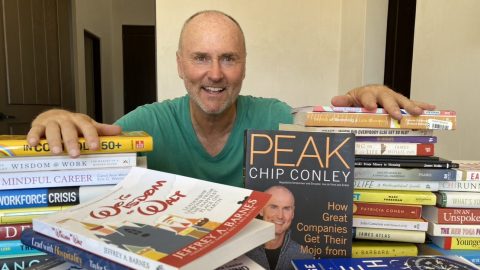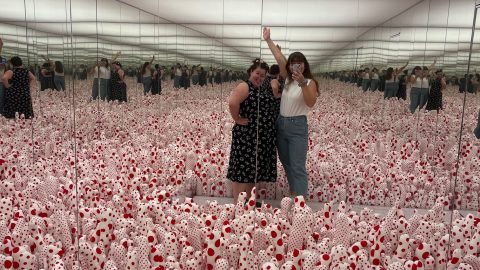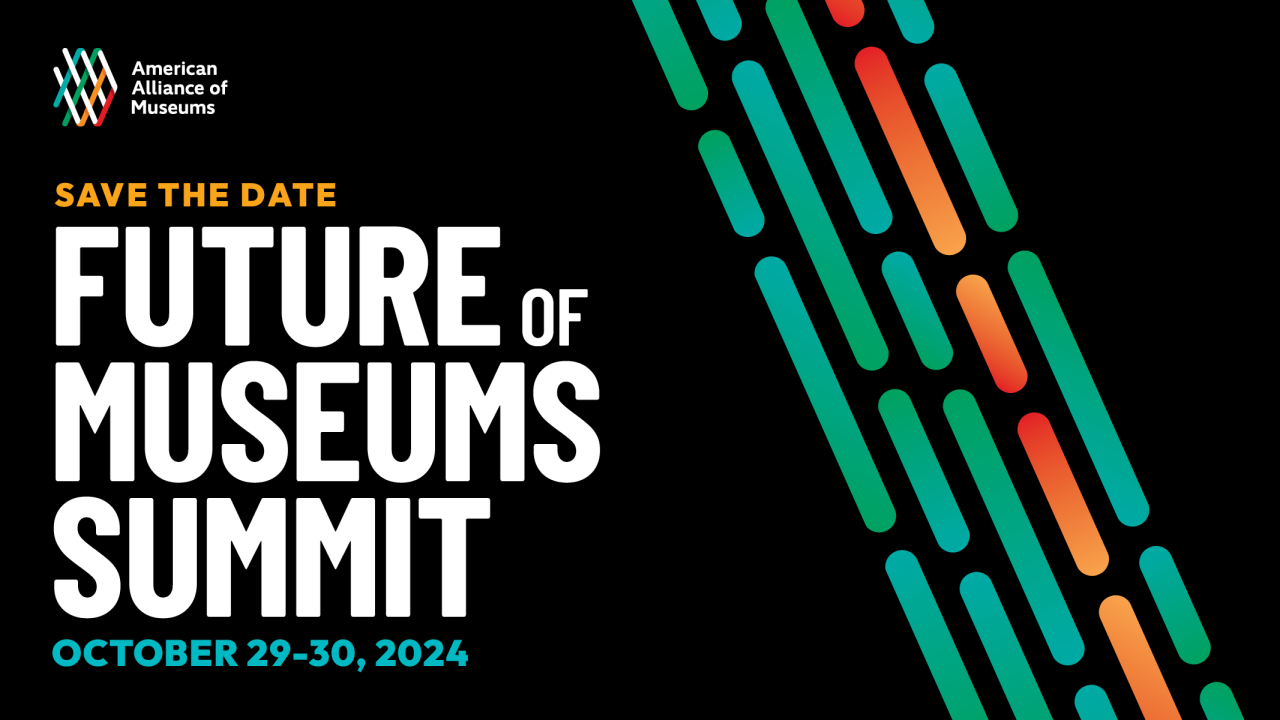
I’m hunkered down writing introductions for the speakers taking the virtual stage next week for the second annual Future of Museums Summit. One of the things I like best about this event is that it gives me a chance to share with you some of the marvelous people I’ve met in the course of my work: people with deep expertise in the topics I bring forward for your attention.
The program kicks off on October 29 at 1 pm ET with a keynote by one of my favorite futurists. The next day, at 1:30 pm, you’ll have the choice of four fantastic Big Idea talks, one for each of our four session tracks. Today I’m previewing these speakers to encourage you to register (if you haven’t already) and, for those already planning to join us, to help you choose which of the Big Idea talks to attend. (Though not to worry, the recordings will be available to registrants until January 31, 2025, so you can catch up on the ones you missed.)
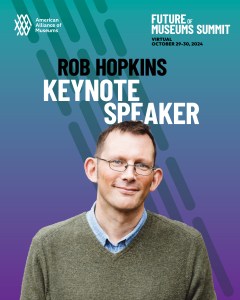 First, our keynote speaker: Last year Dr. Jane McGonigal launched the Summit with a pep talk on building urgent optimism for the future. This year I’m so happy to introduce you to Rob Hopkins—a futurist, time traveler, and imagination catalyst trainer based in Totnes, England. I fell in love with Rob’s work through his marvelous podcast From What If to What Next, where he shared provocative, optimistic challenges such as “What if we loved politicians?” and “What if we decolonized economics?” (The podcast, alas, came to a close in 2024, but I highly recommend the archived episodes, which you can find on any major podcast app.) Much of Rob’s futures work and his practical activism focus on combating climate change and building resilient futures.
First, our keynote speaker: Last year Dr. Jane McGonigal launched the Summit with a pep talk on building urgent optimism for the future. This year I’m so happy to introduce you to Rob Hopkins—a futurist, time traveler, and imagination catalyst trainer based in Totnes, England. I fell in love with Rob’s work through his marvelous podcast From What If to What Next, where he shared provocative, optimistic challenges such as “What if we loved politicians?” and “What if we decolonized economics?” (The podcast, alas, came to a close in 2024, but I highly recommend the archived episodes, which you can find on any major podcast app.) Much of Rob’s futures work and his practical activism focus on combating climate change and building resilient futures.
On to our Big Ideas speakers:

You may already know Sree Sreenivasan, former Chief Digital Officer at the Metropolitan Museum of Art, and now co-founder and CEO of Digimentors, a social/digital/AI training and consulting company. For the past year, he’s been teaching his “Non-scary Guide to AI” workshops and working with clients on AI policy, strategy, and scenario planning. In writing up his speaker text for the Summit, I was intimidated by the other accomplishments in his bio: In 2015, Fast Company named him one of the hundred most creative people in business. In 2004, Newsweek named him one of the twenty most influential young South Asians in America, along with Kamala Harris, M. Night Shyamalan, and Norah Jones. (I know, right!?!?!) In 2020, the President of Italy awarded Sree the knighthood of the Order of the Star of Italy for his role in promoting US-Italian relations. Sree is going to enrich the AI Adolescence track with his observations on “AI & Museums: Beyond the Hype and the Backlash.”
 While most of the sessions in our “Net Zero” track look at practical ways museums can reduce their carbon impact, Dr. Susan Clayton is going to make sure we don’t lose track of the psychological cost of the climate crisis. As the Whitmore-Williams Professor and Chair of Psychology at the College of Wooster in Ohio, Susan’s research explores people’s relationship with the natural environment and how climate change affects mental health and well-being. A fellow of the American Psychological Association and the International Association of Applied Psychology, she was a lead author on the Sixth Assessment Report of the Intergovernmental Panel on Climate Change. In her talk, Susan will address how climate change affects our psychological well-being, including threats to identity and grief over environmental losses, as well as how museums can help mitigate this damage.
While most of the sessions in our “Net Zero” track look at practical ways museums can reduce their carbon impact, Dr. Susan Clayton is going to make sure we don’t lose track of the psychological cost of the climate crisis. As the Whitmore-Williams Professor and Chair of Psychology at the College of Wooster in Ohio, Susan’s research explores people’s relationship with the natural environment and how climate change affects mental health and well-being. A fellow of the American Psychological Association and the International Association of Applied Psychology, she was a lead author on the Sixth Assessment Report of the Intergovernmental Panel on Climate Change. In her talk, Susan will address how climate change affects our psychological well-being, including threats to identity and grief over environmental losses, as well as how museums can help mitigate this damage.

I confess that writing about Culture Wars for TrendsWatch left me feeling pretty discouraged. One thing that lifted me up out of that funk was the work of Mathieu Lefevre, CEO and Co-founder of More in Common. Mathieu’s work at More in Common focuses on understanding the forces driving us apart, finding common ground, and bringing people together to tackle shared challenges. At the Summit, he will deconstruct some of the factors contributing to the “polarization illusion,” including the role of the media, social media, and the “polarization industrial complex.” Mathieu has some ideas about what we can all do to stem the tide of polarization and the critical role museums can play as convening places and community spaces.
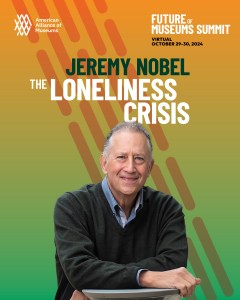 If researching topics for TrendsWatch has taught me anything, it is that for any challenge in the world, there are amazing people working to find solutions. The current loneliness epidemic is a case in point. Dr. Jeremy Nobel is an actual doctor—a primary care physician and public health practitioner with faculty appointments at the Harvard T.H. Chan School of Public Health and the Harvard Medical School. (He’s also an award-winning poet. Not that I’m going to get an inferiority complex or anything. Yikes.) Jeremy is the founder of the Foundation of Art and Healing, and his 2023 book Project UnLonely looks at how we can heal the current “crisis of disconnection.” At the Summit, he’ll draw on his work to offer some insights and strategies for how museums can play a role in that process of healing.
If researching topics for TrendsWatch has taught me anything, it is that for any challenge in the world, there are amazing people working to find solutions. The current loneliness epidemic is a case in point. Dr. Jeremy Nobel is an actual doctor—a primary care physician and public health practitioner with faculty appointments at the Harvard T.H. Chan School of Public Health and the Harvard Medical School. (He’s also an award-winning poet. Not that I’m going to get an inferiority complex or anything. Yikes.) Jeremy is the founder of the Foundation of Art and Healing, and his 2023 book Project UnLonely looks at how we can heal the current “crisis of disconnection.” At the Summit, he’ll draw on his work to offer some insights and strategies for how museums can play a role in that process of healing.
I hope to see you at the Summit next week. If you haven’t snagged tickets yet, register now and start planning your agenda for the day.
Warmest regards from the future,
Elizabeth
Elizabeth Merritt
VP Strategic Foresight and Founding Director, Center for the Future of Museums
American Alliance of Museums





